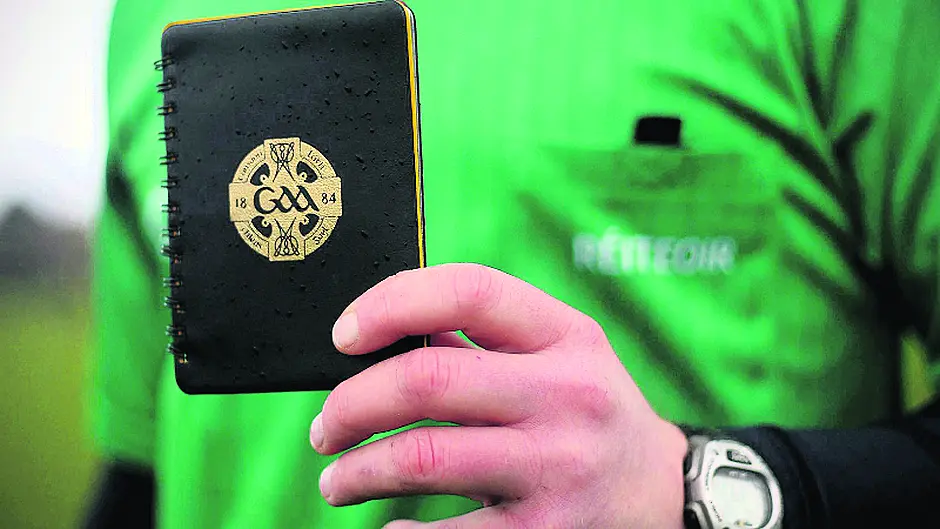Ephie Fitzgerald isn’t a fan of the black card in GAA. And he’s not alone.
EPHIE Fitzgerald isn’t a fan of the black card in GAA. And he’s not alone.
‘It’s been an absolute disaster. It’s ridiculous,’ the Cork ladies football manager told The Southern Star this week, before adding, ‘the black card hasn’t worked at all.’
Heads all over GAA land nod in agreement.
Fitzgerald is not the only one who shares this thought, as after three seasons of the black card it continues to be one of the main talking points each year and hogs too many headlines; that in itself is an indicator that something is badly wrong.
Look at the national newspapers this week in the aftermath of last Saturday’s All-Ireland SFC final replay between Dublin and Mayo, and see how many column inches were taken by the continued debate around the black card.
The motives behind introducing the black card at Congress in 2013 were spot on, its intentions noble, to stamp out cynical fouling in football, but three years in, the continued lack of consistency by referees is frustrating for everyone, from players to supporters.
What one referee deems to be a black card offence, another feels warrants a yellow and another might decide not to act. We’ve all see it at various GAA games, whether that’s club level or inter-county. The only consistency of the black card has been the inconsistency in implementing it.
The black card has a defined set of rules that punish certain fouls, but it’s still open to interpretation by referees – and that lack of consistency is the black card’s greatest weakness and why it needs to be show its own black card, and be replaced by the sin bin.
Other sports use a sin bin, like rugby union, hockey, and ladies football since 2004. If a player gets a yellow card then they are sent to the ‘sin bin’ for ten minutes of playing time, leaving their team down in numbers for that period of time.
The sin bin acts as a deterrent to players, and Dublin boss Jim Gavin, after last Saturday’s All-Ireland SFC final replay win against Mayo, said: ‘It is time to have another look at the sin bin. I would advocate that, I have always advocated it.’
Ireland international hockey goalkeeper and captain David Harte, from Ballinspittle, is also a fan of the sin bin, which is used in hockey.
‘It does work as a deterrent against cynical fouling and unsportsmanlike play. In hockey the green card means two minutes in the sin bin, and there is a five-minute yellow and a ten-minute yellow, depending on the severity of the foul or action,’ David explained.
‘It does give the team that is at full strength an advantage and it can play a part in deciding the outcome of a game.’
There has been talk of making referees professional or introducing television replays for big decisions, but the next step should be to revisit the sin bin, which was trialled before in the GAA, but without much success.
At Congress in 2009, a proposal to introduce the sin bin received backing from 64% of the delegates, but was eight votes short of the two-thirds majority needed.
Times have changed, and there is more willingness these days to embrace change in the GAA, especially a move that can help clean up the game without incorrect decisions blighting a match.
But what’s key to this, whether it’s trialling the sin bin again or persisting with the black card, is ensuring that this disciplinary procedure is implemented properly and fairly. The parameters that govern either the black card or the sin bin must be defined more clearly.
But while there is growing momentum behind the possibility of the sin bin, Ephie Fitzgerald feels the men’s game doesn’t need it. He has seen the sin bin up close and personal this year as manager of the Cork ladies football team, and while it’s worked as a deterrent to his team – ‘I think we had only one yellow card all season,’ he said – the jury is still out on whether it would work in the men’s game, he says.
‘If the rules were carried out properly, yellow and red cards are more than enough. If you get a yellow card then you know you’re on a warning. I think the sin bin could turn into a fiasco as well. If the refereeing was consistent and the rules were implemented properly it would help,’ the Nemo Rangers man.
There’s for and against for the sin bin, and it won’t magically wipe out cynical play, but it will still punish a player and his team if he steps outside the laws of the game – but it’s a fairer punishment.
The sin bin has worked in other sports, and while it’s been trialled before in the GAA without much success, the growing apathy towards the black card has opened the door for it to, at least, be put forward as a sensible and practical alternative to the black card.









